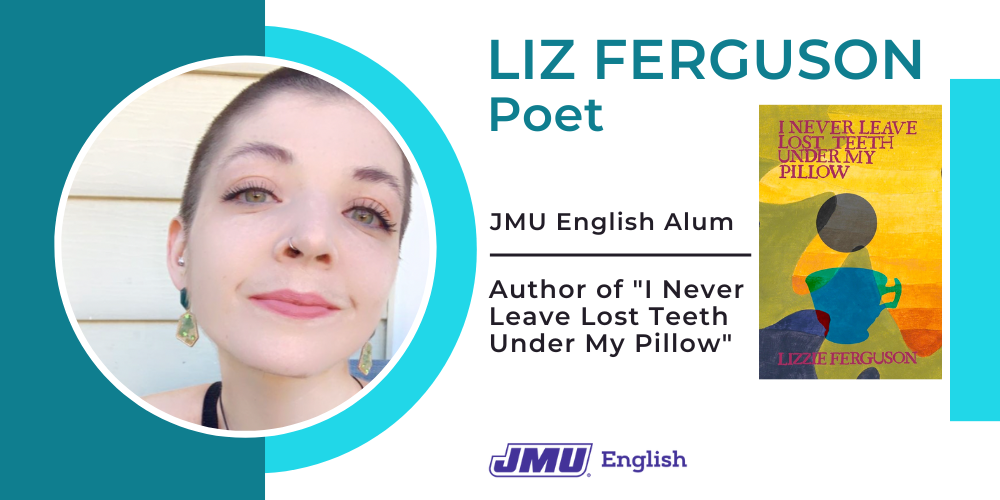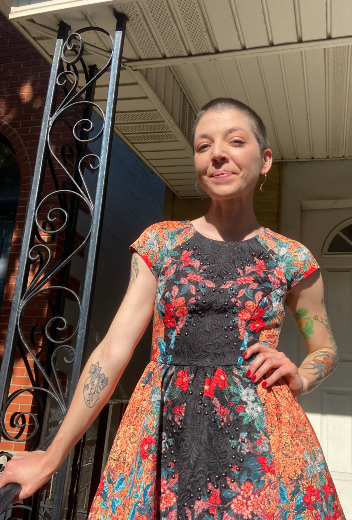JMU English Alum, Liz Ferguson, is Published
Celebrating the publication of "I Never Leave Lost Teeth Under My Pillow"
English
SUMMARY: JMU English Alum, Liz Ferguson, has a recently published chapbook, "I Never Leave Lost Teeth Under My Pillow"
Did your experience at JMU influence or spark creativity for “I Never Leave Lost Teeth Under My Pillow”?
I Never Leave Lost Teeth Under My Pillow is a challenge to the reader to embody different stages — ”spirals” in the text — of presence, growth, and complexity. These themes of presence, growth, and complexity, were interwoven into my time at JMU. JMU provided me the space to explore my own coming-of-age, determine what freedom and autonomy mean to me, and assisted me in making sense of a world that often seems senseless. Poetry became the medium by which I was able to process the growth I was experiencing as an undergraduate student in the English Department. The university experience at JMU opened my eyes to the intersectionality and complexity of my interests and passions, which ultimately led to me writing and reflecting on these intersections.
The supportive community I found at JMU laid the bedrock for my exploration of my own creativity and my efforts to use language to heal.
JMU's energy, vibrancy, and diversity empowered and challenged me during my four years of undergrad and has had a lasting impact on my writing as well as my identity.
Were there any academic courses that prepared you for authorship post-graduation?
One of the most impactful classes that I took in regard to poetry was the Creative Writing Introduction to Poetry class offered at JMU. I was hesitant to take a creative writing course as I was accustomed to keeping my writing separate from my academic pursuits and wrestled with insecurities about sharing my work with others. The intro to poetry class was a welcome, affirming, and inspiring place to tackle some of these insecurities. I found the class to be a challenging but fulfilling way to hone in on my own writing style. To receive feedback from my classmates on the strengths and weaknesses of my work helped me to not only find my voice but to find the confidence to use it. I was also greatly impacted by the Environmental Humanities Minor, of which I was honored to be among the first graduating class.
What advice would you give a current duke who is looking to establish themselves as a poet?
First, on a more abstract level, my advice would be to believe with your whole being that you are already a poet. No publication will prove that your poetic expression is valid, rather, acknowledge that your work is vital to your own self unfolding. By that I mean, write for yourself, not for a publication. When you write with authenticity and rawness, it will show through much more on the page than writing for what you think an audience wants to hear.
On a practical level, my advice would be to find community. Though much of the creative experience of writing happens alone, hunched over a desk or taking a long solitary walk in the woods, fellow writers and artists provide vital feedback and networking opportunities that can assist you, encourage you, and point you in directions that you never thought to look. For me, getting connected to the literary community in Chicago, attending open mics, sharing my work, following fellow poets on social media in my area and so on, were key in finding a publisher that meshed with my style of writing and vision for the chapbook.

Being an English major, what opportunities became available for you to pursue writing?
The English major at JMU provided me opportunities to reflect on the power of story, and the danger of a single story. I learned the importance of building relationships and truly listening to the stories of others, which in turn, assisted me in crafting my own story.
Furthermore, being an English Major gifted me with a diverse array of author voices from which I was able to reflect and glean wisdom and inspiration. So much of writing for me is about relationships: my relationships with others, with myself, with the universe, with nature. The faculty in the English department emphasized the importance of relationships in writing, such as the relationship of the author to the text, the reader to the text, the reader to the author, us in the classroom and our relationships with one another. I learned the importance of engaging with a text as a living thing with which I can and should be in relationship. This bedrock allowed me to approach my own work with patience and grace, remembering my own relationship to the poems, while keeping in mind the relationship that the reader may have with the words (which might be totally different from my relationship to them!) and the impact that my words on a page can carry.
Are there any staff, faculty, or friends at James Madison who assisted you in the release of your first collection of works?
I owe a debt of gratitude to two professors, Dr. Castellano and Dr. Fagan, who were instrumental in shaping my academic career at JMU while an undergrad and whom I have had the pleasure of keeping in touch with post-graduation. Though they did not directly assist with the publication, their wisdom and guidance are embossed on every page.
Do you have a favorite line/passage in this work (and why)?
Perhaps not my favorite but a piece that I am proud of is certainly "Tweet Tweet, Little Bird" because of its diversity in form and style. This form makes poetry accessible and relatable and encourages everyone to see themselves as a poet. We have the power to redefine poetry and consider conversations to be poems, even tweets can be poems, as “Tweet Tweet, Little Bird” exemplifies.
Can you share an excerpt (or two) from your chapbook?
“Thursday
There's nothing new under the sun: So I worship the moon and am pulled by her tides and am pushed, nearly drowning,
still I choose the darkness.”
“Friday
I keep trying to print pages of art
that I know will be healing for others
but I’ve been out of ink for days
and I don’t have the courage
to ask anyone else to go buy some
so I survive by writing with my own blood."
